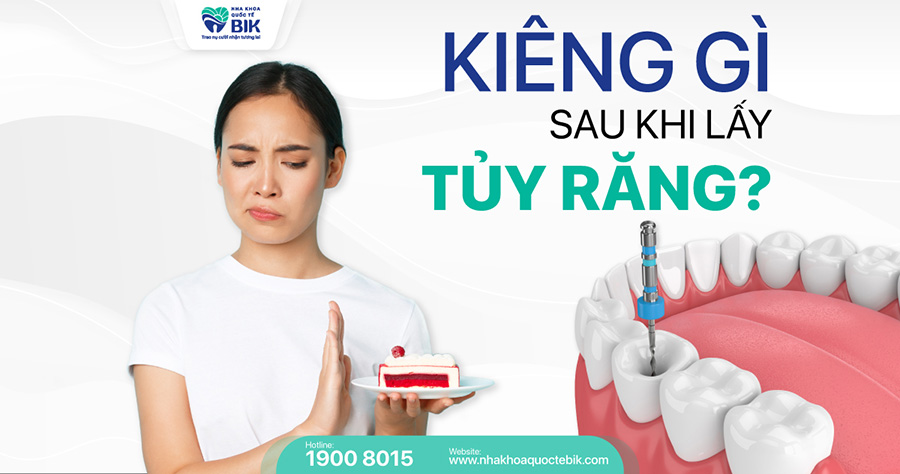
Root canal treatment affects the structure and makes the teeth sensitive, not as strong as before, although this is an effective remedy for pain and discomfort caused by inflammation. Therefore, what to avoid after a root canal is an issue that many people are interested in to protect their teeth from the effects of chewing as much as possible. Applying a reasonable menu every day helps limit the situation of teeth being broken, cracked or even falling out after a root canal.
1. Does it hurt after a root canal?
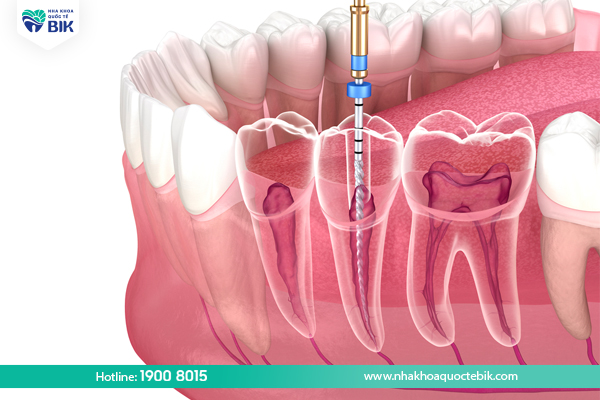
Pulp extraction is the process of removing all the dead and inflamed pulp inside the root canal and then filling the empty spaces with specialized materials to eliminate the prolonged pain that causes discomfort to the patient. To do this, the enamel and tooth structure will be affected, so pain is inevitable.
However, with the development of modern dental technology, the process of root canal extraction will be completely painless and very gentle and quick thanks to the support of local anesthetic. However, a few hours after root canal extraction, the patient may begin to feel a little uncomfortable because the anesthetic gradually wears off.
This is a very normal symptom and will disappear after a few days. If the pain persists without any signs of improvement, it is likely that the doctor did not clean the root canal or there was an error during the treatment process that affected the soft tissue. At this time, the customer needs to go to a reputable dental clinic to have the doctor check and fix it promptly.
2. What to avoid after a root canal?
Performing a root canal makes the teeth more sensitive and not as strong as before. Therefore, to protect the teeth, customers should pay special attention to their daily diet. Below are the foods to avoid after a root canal:
2.1. Hard foods
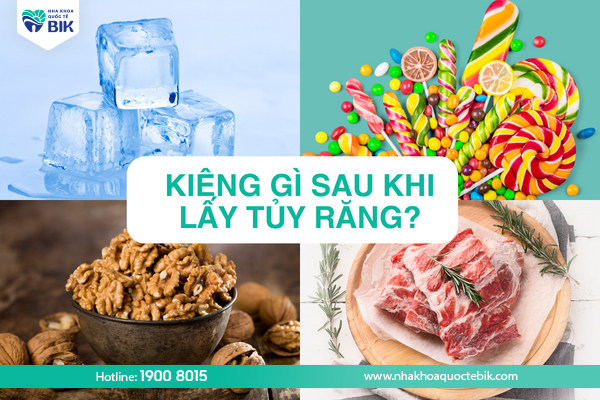
The dental pulp is considered the “heart” of the tooth, the part that contains blood vessels as well as connecting nerves, playing an important role in providing nutrition to tooth tissue cells. Therefore, when the pulp is lost, the tooth will no longer be as strong and durable as before.
Therefore, patients should avoid eating hard foods that require great force to grind. If you bite or chew too hard, the tooth can completely break, chip, or fall out.
Some specific hard foods are as follows:
– Ice
– Dry food, cakes, hard candies
– Nuts such as walnuts, cashews, …
– Pork ribs, chicken wings, …
– Fresh fruits such as guava, apples, … or dried fruits
2.2. Foods that are too tough
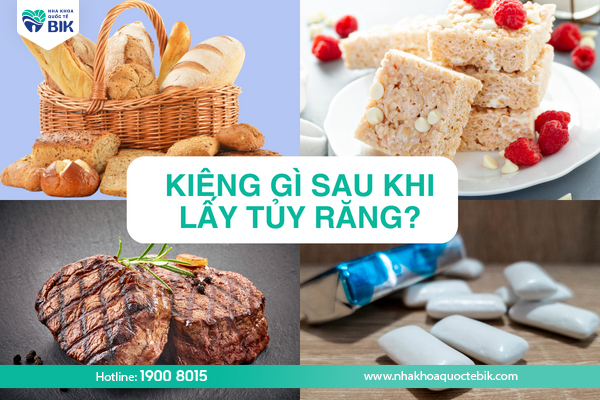
To protect teeth, foods that are too tough are also on the list of foods to avoid after a root canal. The reason is that when eating tough, difficult-to-grind foods, the molars will have to move at high intensity for a long time, causing pain and more breakage.
In addition, tough foods are easily stuck in the tooth roots and between teeth, making oral hygiene difficult. If not cleaned properly, bacteria can multiply and attack, causing more serious tooth infections.
Specifically, customers should avoid some tough foods such as:
– Meats such as beef, chicken, pork, … when not cooked soft
– Bread, sticky rice cakes, rice cakes, …
– Chewing gum, marshmallows, …
2.3. Food that is too hot or too cold
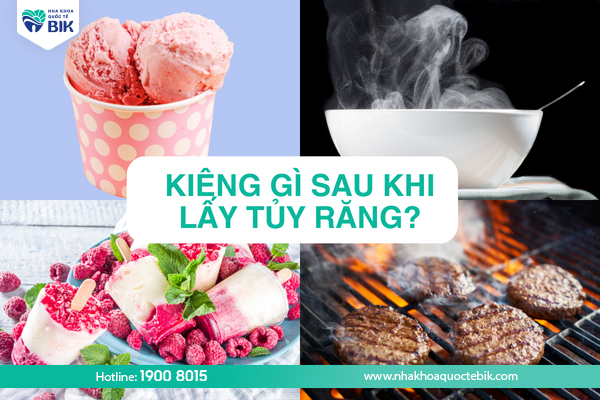
After a root canal, teeth will also lose the ability to detect the hot or cold of foods such as water, so the temperature of the food should also be considered during meals. If customers often eat foods that are too hot (above 60 degrees Celsius) or too cold (below 40 degrees Celsius), the tooth structure will often change, expand or contract suddenly.
This is also one of the main causes of cracked enamel, especially in cases where teeth have had a root canal and have a weak tooth structure, it can also cause pain and discomfort.
Specifically, patients should avoid eating some foods that are too hot or too cold such as:
– Ice, ice water.
– Smoothies, ice cream, cold yogurt, …
– Hot soup, hot soups, …
2.4. Spicy foods
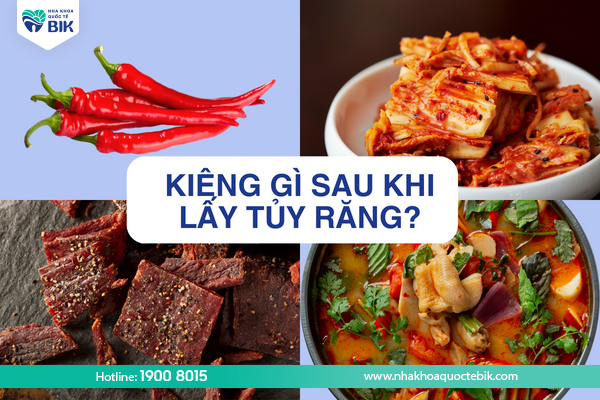
The wound after a root canal will take longer to heal when it is frequently exposed to hot and spicy spices. Sensitive teeth, when exposed to spicy and strong spices, will cause the patient to feel severe pain and soreness.
In case the wound does not heal for a long time, bacteria will begin to grow and attack, causing more serious oral diseases such as: periodontitis, gingivitis, periodontitis, tooth loss, etc.
In addition, spicy foods are also the main cause of some problems such as tooth enamel damage, tooth erosion or stomach-related diseases such as: stomach pain, gastric reflux, etc.
After removing the tooth pulp, customers need to abstain from eating some common spicy dishes as follows:
– Spicy spices: Chili, chili powder, chili sauce, pepper, chili salt, satay, etc.
– Spicy pickled and marinated foods such as kimchi, dried meat, etc. or spicy hot pot
– Some spicy snacks with eye-catching dark red color
2.5. Carbonated drinks and other stimulants
Some carbonated drinks should also be limited because they will affect the tooth with dead pulp, causing pain. In addition, other stimulants such as alcohol, beer, and cigarettes will also affect tooth enamel, causing discoloration and yellowing of teeth, causing loss of aesthetics.
3. What should you eat after a root canal?

To protect teeth from the effects of chewing, customers can choose some of the following foods:
3.1. Soft, liquid foods
Soft, liquid foods such as porridge, soup, milk, etc. are foods that customers should eat after a root canal. Because you don’t need to use much force when eating these foods, your teeth will be completely protected, without fear of breaking, cracking, etc.
3.2. Foods low in sugar and starch
Customers should limit sugar and starch in their daily menu. These are two types of ingredients that easily turn into bacteria when they exist in the oral cavity without being cleaned thoroughly. Bacterial attacks will cause other oral diseases such as tooth decay, periodontitis, etc.
3.3. Green vegetables, not too hard fruits
Fruits that are cool and don’t require much force when chewing such as oranges, avocados, grapes, bananas, etc. are great sources of food that provide all the necessary vitamins and minerals for the body without affecting sensitive teeth.
4. What should you do after a root canal?

Customers should note the following to effectively care for their teeth after root canal treatment:
4.1. Proper oral hygiene
Brush your teeth with a soft-bristled toothbrush that fits your mouth and use just enough force to avoid damaging the root canal treated tooth.
Use toothpaste containing fluoride to help strengthen teeth.
Combined with dental floss to completely remove food debris between teeth, avoiding tartar buildup that can affect the root canal treated tooth.
4.2. Pay attention to some unusual symptoms
In case of unusual symptoms after root canal treatment, customers should go to a reputable dental facility for treatment as soon as possible to avoid serious effects on oral health.
Customers should note the following symptoms:
– Sensitivity, persistent pain that does not subside.
– Gums are swollen and show no signs of swelling decreasing after 2 – 3 days.
– The nerve under the tooth is accidentally affected, affecting health.
4.3. Regular check-ups
Customers should have regular dental check-ups at least once every 6 months so that the doctor can monitor the condition of the teeth. In case of any unusual problems, the doctor will promptly treat them to avoid prolonging and seriously affecting oral health.
So with the information provided in the above article, BIK International Dental Clinic hopes that you know clearly what to avoid after a root canal. Because the teeth after a root canal are no longer as strong as before, to minimize the risk of tooth breakage, customers will need to pay special attention to their diet after a root canal. In case of some unusual symptoms, customers should go to a reputable dental clinic for timely treatment.


















